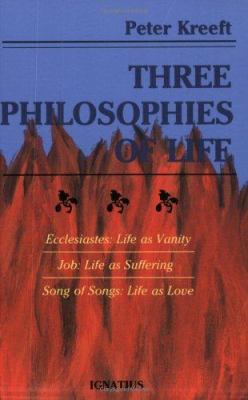Peter Kreeft's Three Philosophies of Life (1989) is a philosophical, theological, and practical exploration of the the themes of vanity, suffering, and love. He explores each of these "philosophies of life" through the biblical wisdom literature. In particular, ecclesiastes represents vanity, Job represents suffering, and the Song of Songs represents love.
The longest section dealt with Ecclesiastes, which Kreeft regards as one of the finest philosophical "books" ever produced because it deals so well with a basic human issue. He writes, "Ecclesiastes is as great, as deep, and as terrifying as the ocean." For him, though the book is several thousand years old, its practical relevance today is unparalleled.
The second section, which deals with the suffering of Job, is also deeply relevant to modern life. He wrestles deeply with the what suffering means in life without minimizing it or avoiding its reality, much like the author of Job did.
My favorite section dealt with Song of Songs, the final "philosophy of life." He writes, "The Song of Songs is the definitive answer to the question of Ecclesiastes and to the quest of Job." He proceeds to show the many different manifestations of love evident through the writings of this short book. One of my favorite, extended quotes, appears near the end of the book.
"But what about sin? Does God just hide his eyes? How can that be realism? God does not hide his eyes. Your eyes are hidden in time, hidden from your eternal destiny and identity. You see only the present crude sketch of yourself. He sees the completed masterpiece, for he sees from eternity. Your life is like a string pulled taut. Like an ant, you crawl along the string of your lifetime, from one end (birth) to the other (death). But God sees the whole string end on, from the end. He blinks at nothing; he sees everything in its true perspective. He sees your whole life, but not as you do, piecemeal. He sees you whole, as a finished painting. And the judgment he pronounces on you is 'perfect.'"
Three Philosophies is a good little book. Despite the fact that it is written by a philosopher, it is accessible, clear, and engaging.


No comments:
Post a Comment